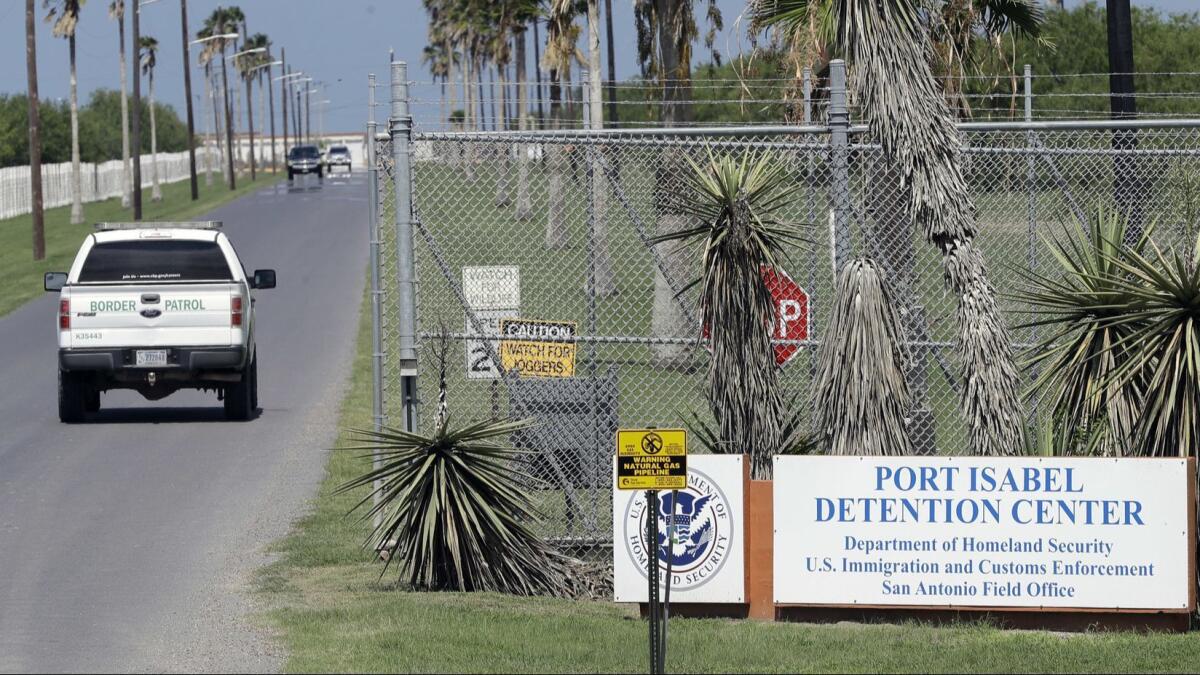Commentary: Immigrant detention is a reminder to look at inhumanity throughout history

- Share via
Reports from observers at the U.S.-Mexico border show that despite the recent executive order that was supposed to end family separation, the humanitarian crisis continues to affect families, including families that have come to the United States legally seeking asylum.
Sen. Elizabeth Warren’s Facebook report from the border facility in McAllen, Texas, describes an enormous warehouse “filled with cages. Cages for men. Cages for women. Cages for mamas with babies. Cages for girls. Cages for boys.”
Young children being locked in separate cages, away from their mothers, but in the same enormous facility, counts as being “not separated.” Regarding the children who are already separated from their families, scattered all over the country, there is no clear system in place for keeping track of them and reuniting them.
And yet, in the face of this inhumanity, otherwise well-meaning, generous people shrug and try to turn the situation into a policy debate. The Trump administration’s recently implemented “zero tolerance policy” is by no means the only available method for enforcing our laws. These recent policies threaten to cast aside existing legal processes for handling lawful and unlawful immigration and asylum cases.
What is clear is that this situation is a humanitarian crisis independent of the technicalities of immigration policy. Over 2,000 children have already been taken from their families, according to NPR. Some parents have already been deported, leaving young children stranded in the United States.
No matter what Congress eventually decides to do with immigration policy, the current situation is an affront to American values like the importance of families and the dignity of every person. The recent policies, which have caused this crisis, must be swiftly corrected.
The lessons of history show that the tendency to deny human dignity to other groups who we perceive as dramatically different along ethnic, political, national or religious lines is strong. This tendency to see certain groups as undesirable and less than fully human like ourselves led us to the Holocaust, to the Rape of Nanking, to the internment of my Japanese American grandparents Charles Inouye and Bessie Murakami behind a barbed wire fence in Heart Mountain, Wyo.
When we read the histories, we shake our heads and think, “How could those people do that? How could they agree to either actively participate or silently comply? Where were their values? Their moral compasses? Their sense of shared humanity?”
The point is that in all of these situations, people who committed or tacitly accepted gross crimes against humanity didn’t think that they were doing something that would go down in history as horrific and shameful. They thought that they were the good guys, and the other people were the bad guys. They thought that in this particular case, “those people” really did deserve what they got, that inhuman actions like “the final solution” were simply sound policy.
These attempts to justify inhumanity have always been proved wrong. This dismal track record should give us pause now as we consider whether it is acceptable to take babies and young children from their parents’ arms, perhaps permanently, in an attempt to deter others from coming to our country.
I was born and raised in Costa Mesa and attended Estancia High School. One of the greatest gifts that Estancia gave to me, which I have carried throughout my life, has been the friendship of people who were children of immigrants from Central America, who studied with me in chemistry class and ran with me on the cross country team.
Over 20 years after our graduation in 1997, these friends whose parents brought them from Central America are successful business owners and engineers, caring mothers and fathers. They are pillars of our communities and a credit to America. Therefore, this recent upsurge in virulent anti-immigrant rhetoric makes me sick. Surely as a multicultural nation built on layers and layers of immigration, we can work out more sensible and effective policies for maintaining our borders without demonizing and denigrating entire groups of people.
On Saturday my family and I will be participating in demonstrations — being held all over the world — to stand up for families. We cannot be silent in the face of this dehumanization.
Now is the time for all Americans to learn from the bitter lessons of history, and, this time, to take measures to ensure that our obligation to enforce our laws will not prevent us from fulfilling our higher obligation to uphold our core values of protecting children, keeping families together and respecting human dignity.
Melissa Inouye was born and raised in Costa Mesa.
All the latest on Orange County from Orange County.
Get our free TimesOC newsletter.
You may occasionally receive promotional content from the Daily Pilot.





